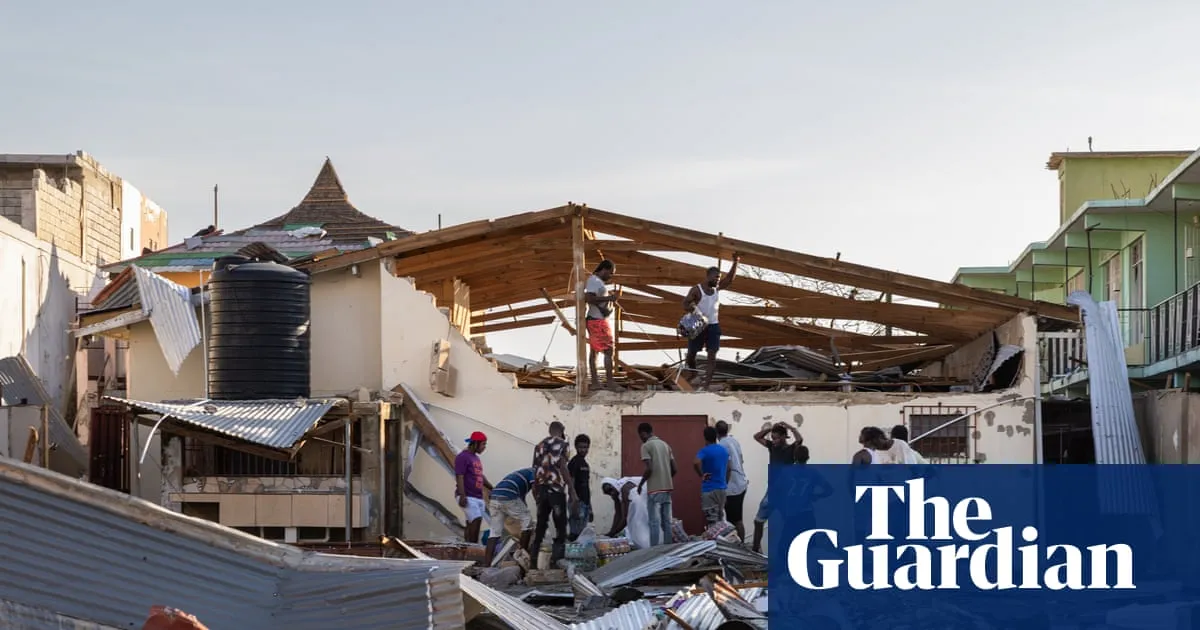
Black River, a coastal town located in Jamaica’s southwestern parish of St Elizabeth, has faced a devastating impact from Hurricane Melissa, one of the strongest Atlantic hurricanes on record. The journey to Black River is fraught with danger as uprooted trees, downed lamp-posts, and rubble from landslides have transformed the roads into a perilous obstacle course. Severe flooding has created conditions where entire communities resemble rivers, making the route to the town nearly impossible.
The aftermath of Hurricane Melissa led to significant chaos on the roads leading to Black River. Vehicles stalled in deep water while police and army personnel struggled to manage long lines of slow-moving traffic in both directions. The destruction is overwhelming, with buildings and homes suffering extensive damage. Many structures have lost their roofs, and the town center now resembles a demolition site, filled with debris and hazardous materials.
As you approach Black River, the extent of the devastation becomes evident. Almost every house and building has been affected, with families experiencing trauma and loss. Some residents are even setting up makeshift residences in bus shelters, while others are desperately searching through debris for food and supplies. This is a stark indication of an unfolding humanitarian crisis.
Beverly Stephens, a survivor of Hurricane Melissa, shared her harrowing experience with the Guardian. Along with her son and elderly mother, who is unable to walk, she sought refuge in a room with a reinforced roof. They spent three terrifying hours holding a door against the fierce winds. Through tears, she emphasized the urgent need for assistance, urging, “Tell the world that Jamaica needs help.”
The death toll from the storm currently stands at around 50, with losses reported in Jamaica, Cuba, Haiti, and the Dominican Republic. Communication networks remain largely down, complicating the situation further and making it difficult to assess the full scale of the damage. According to the US National Oceanic and Atmospheric Administration, Hurricane Melissa tied with a record from 1935 for the most intense Atlantic storm to make landfall.
Residents of Black River are grappling with their losses. One woman shared her intent to report a death, while another expressed despair over losing everything. Annette Royal, visiting from the parish of Westmoreland, lamented the destruction in her area, stating, “The country mash up. We need food, we need water, we need shelter, we need everything to survive.”
Local educator Aston McCatty highlighted the monumental challenge ahead, suggesting it would take “billions upon billions” to rebuild. He pointed to a demolished parish church, lamenting the loss of hundreds of years of history in just one day. The community's resilience is palpable, yet the need for support is urgent.
The nearby tourism community of Treasure Beach has also felt the wrath of Hurricane Melissa. Residents are in shock as they witness the unprecedented power of the storm. Allan Daley, a local fisherman, reported significant damage to his home and boat, stating, “I have never seen anything like this.” Owen Clarke, a hotel owner, echoed the sentiment, highlighting the dire need for rebuilding materials and support for local businesses affected by hurricanes.
Tourists caught in the storm, such as Sri Sudevi and her daughter Rachel Dimond, had to flee to higher ground as the hurricane approached. Despite the fear, they praised the strength and resilience of the Treasure Beach community. Dimond, reflecting on her previous experiences during the Covid-19 crisis, felt reassured by the community's support during the hurricane.
Local chef Candace Dryden is leading efforts to provide hot meals and drinking water to those affected. She emphasized the importance of community in these challenging times, stating, “A warm plate of food will remind people that they’re still home.” Meanwhile, Theresa Rodriguez-Moodie, chief executive of the Jamaica Environment Trust, warns that Hurricane Melissa's strength and slow movement are indicative of climate change. She cautioned that stronger and more destructive storms are becoming more frequent in the Caribbean.
As evening falls in St Elizabeth, heavy-duty military vehicles loaded with supplies are seen navigating the treacherous roads, bringing hope to those affected by Hurricane Melissa. The community's resilience and unity will be vital as they begin the long journey to recovery.